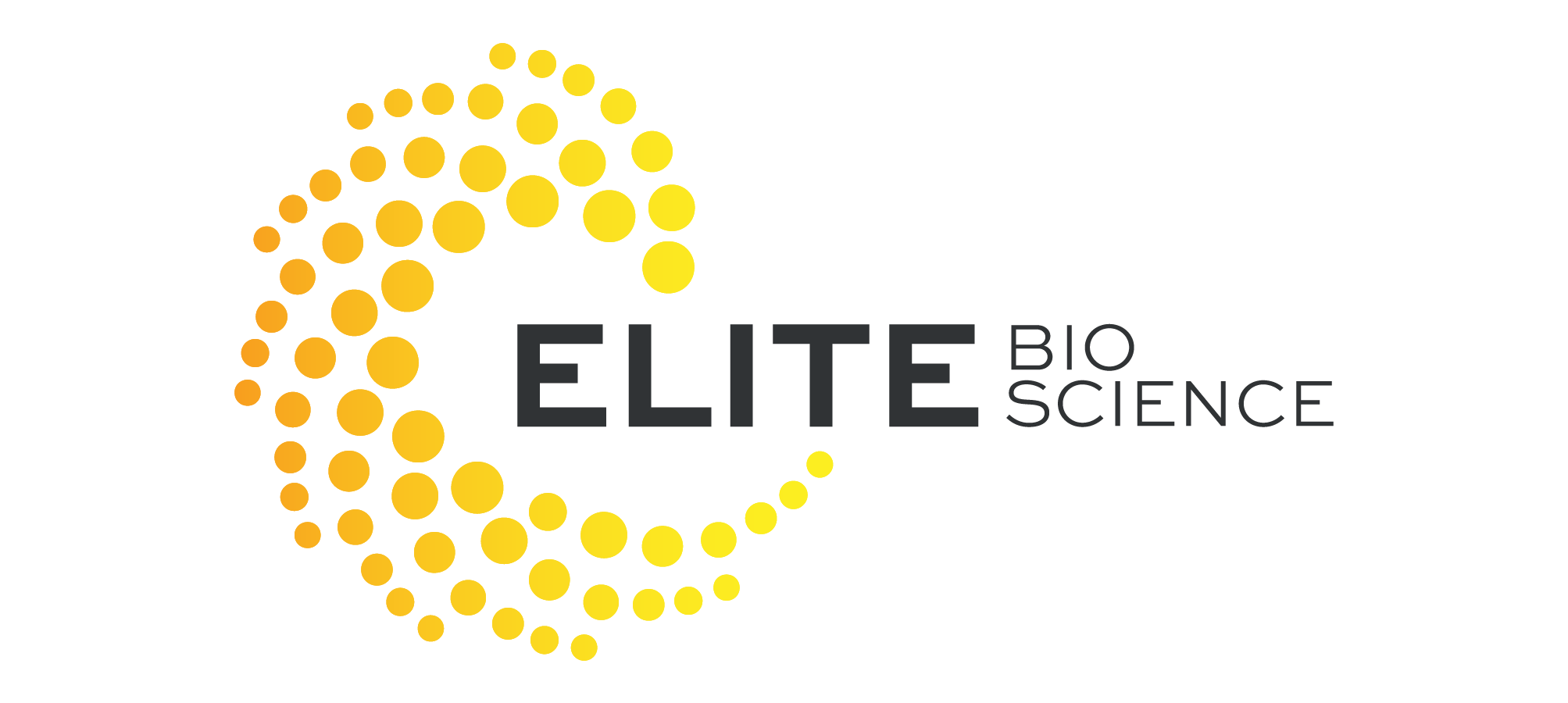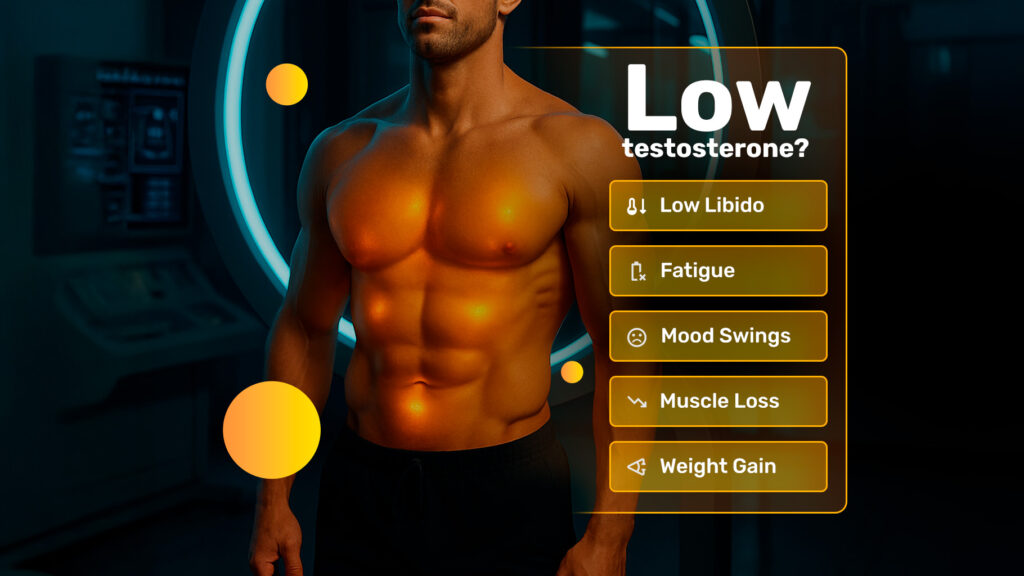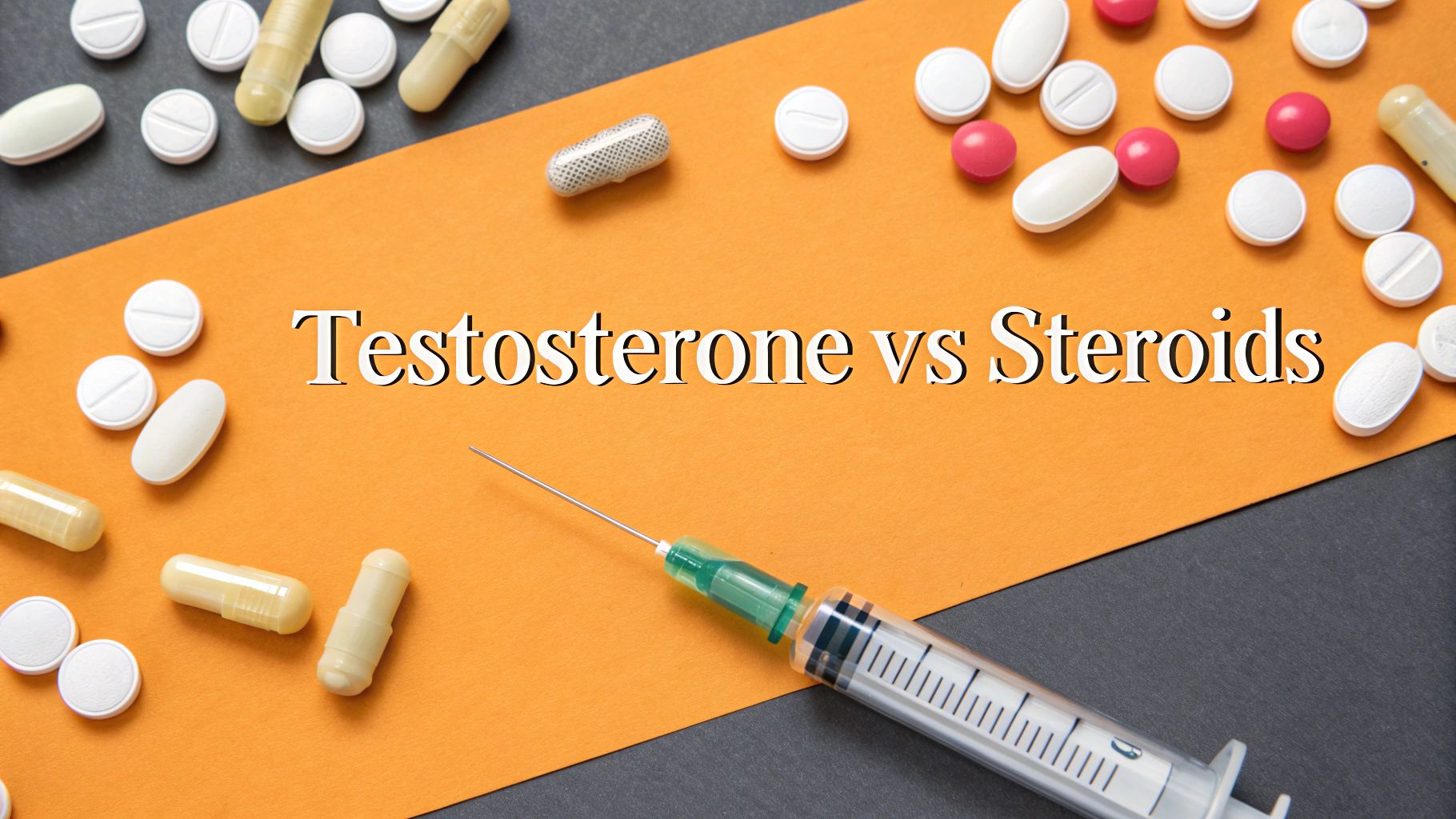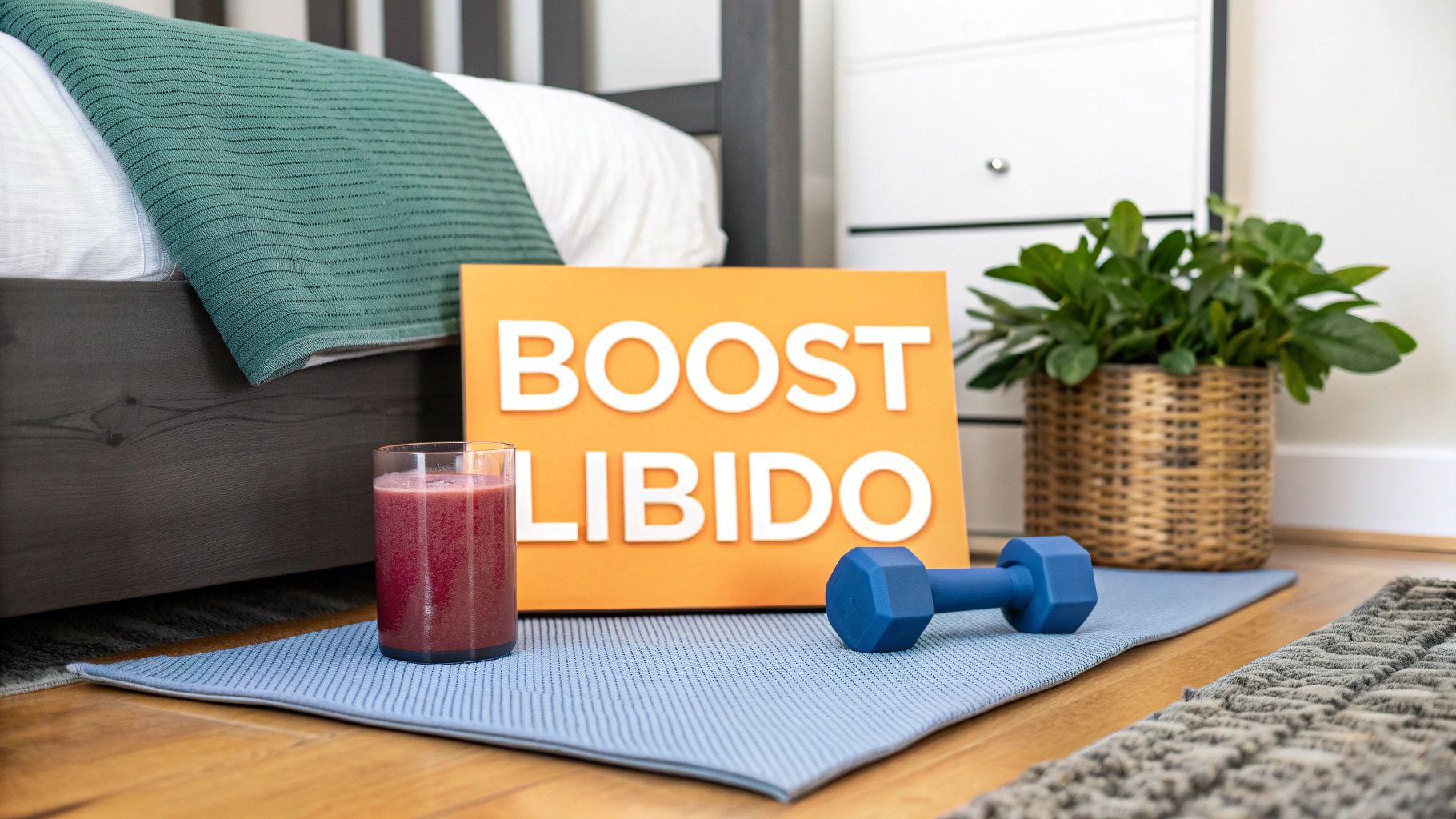Why Your Testosterone Actually Matters Beyond The Hype
Let’s be real, testosterone boosters often get hyped up as the key to superhuman strength and boundless energy. But I want to talk about the real-world benefits of healthy testosterone – the everyday impact it has on your life. Think about having the drive to tackle your to-do list, feeling confident in meetings, or simply enjoying your hobbies after a long week. That’s where optimizing your testosterone truly makes a difference.
I’ve talked with guys who struggle with that 3 PM slump, hitting a wall of fatigue they can’t overcome. Optimized testosterone can be the difference between powering through the afternoon and feeling completely drained. And it’s not just physical energy. We’re talking mental clarity, motivation, and even mood.
Sometimes, declining testosterone shows up in subtle ways you might not even connect to hormones. Maybe you’re less interested in activities you used to love, or you’re withdrawing from social situations. I’ve seen guys who thought they were just getting older, accepting a lower libido and lack of enthusiasm as inevitable. After addressing their low testosterone, they rediscovered their passions and reignited their relationships.
This isn’t about chasing some unrealistic, hyper-masculine ideal. It’s about feeling like the best version of yourself. And surprisingly, a significant number of men are experiencing this. Studies show that testosterone deficiency affects 10%-40% of adult males and about 20% of young men aged 15-39 in the U.S. This can lead to symptoms like low libido, fatigue, and decreased muscle mass. Discover more insights about declining testosterone levels. Many men are now exploring how to increase testosterone naturally, focusing on sustainable lifestyle changes instead of quick fixes.
This shift towards natural optimization shows a growing awareness of how our physical and mental well-being are connected. By addressing the root causes of low testosterone through nutrition, exercise, sleep, and stress management, you’re not just boosting a single hormone. You’re building a foundation for a healthier, more fulfilling life.
The Foods That Actually Boost Your Testosterone
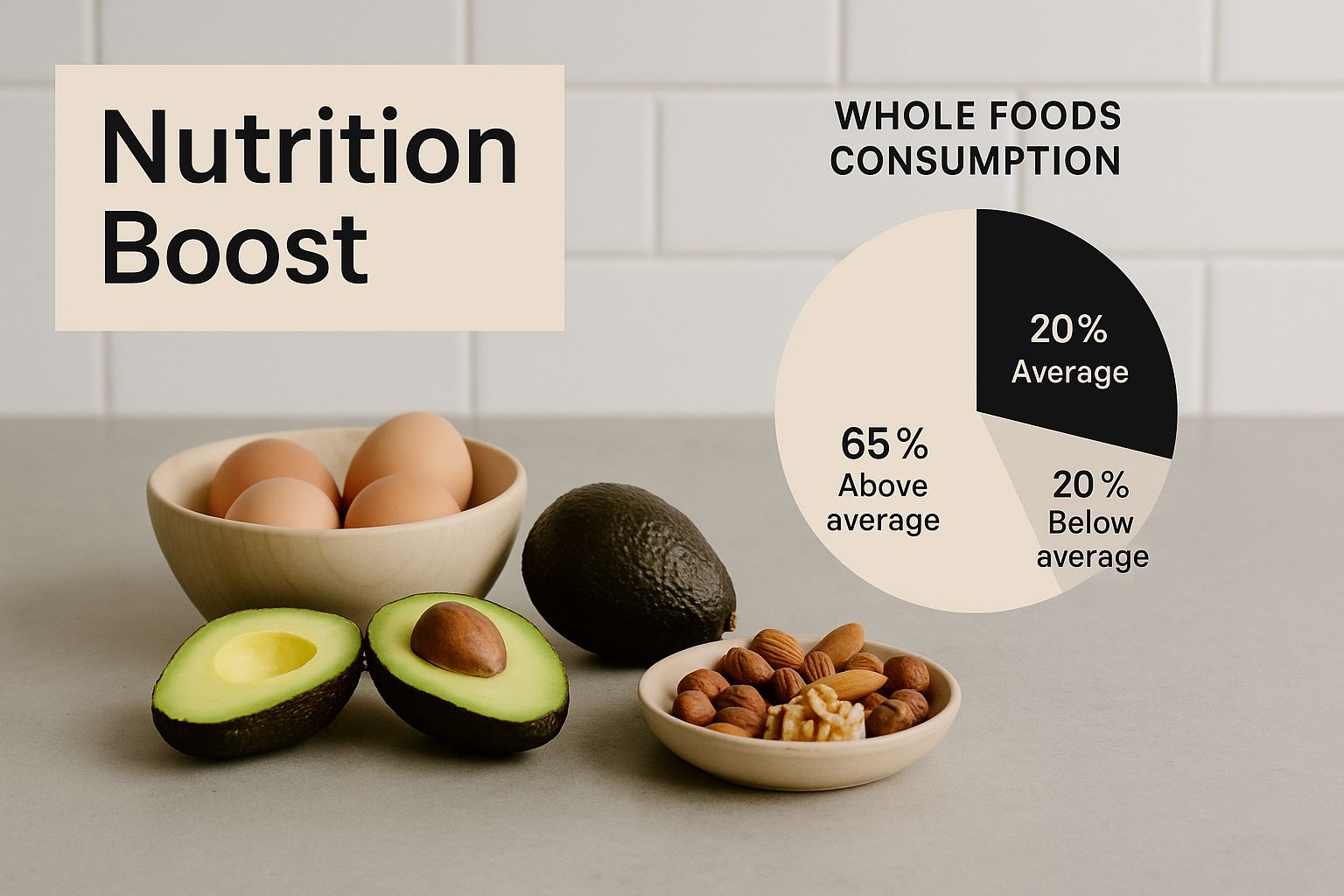
This infographic shows how powerful whole foods can be when it comes to naturally optimizing your testosterone. Think eggs, avocados, nuts – real, recognizable food. It emphasizes that incorporating these unprocessed, whole foods into your everyday meals can be a surprisingly effective way to give your testosterone levels a natural lift.
Instead of reaching for that processed snack, grab a handful of almonds or a hard-boiled egg. It’s a quick, easy win for your hormones. It’s like tapping into the wisdom of our grandparents and great-grandparents, who naturally prioritized whole foods – something we can all learn from today.
Healthy fats are also crucial. Adding avocado to your salads or using olive oil when you cook can make a difference. These healthy fats are the building blocks your body uses to produce testosterone. I’ve seen guys make these small changes and experience real improvements in their energy and how they feel overall. Don’t feel like you need to change everything at once. Small, consistent changes are where it’s at. If you’re interested in diving deeper into this topic, check out this article: Secrets to boosting testosterone levels.
Fueling Your Body’s Testosterone Factory
So, which foods should you be loading up on? Foods packed with zinc, like oysters and beef, are essential for testosterone production. I had a friend who significantly increased his zinc intake and saw a noticeable boost in his workouts. It wasn’t just about lifting heavier; he genuinely felt stronger. And this isn’t just some random story; there’s actual research backing up the link between zinc and testosterone.
Vitamin D is another key player. While sunshine is a great source, adding foods like fatty fish and fortified milk to your diet can help you make sure you’re getting enough. Personally, I’ve noticed that getting enough vitamin D makes a real difference in my mood and energy levels, both of which are tied to healthy testosterone levels.
Meal Timing and Testosterone: What You Need to Know
Surprisingly, when you eat can also influence your testosterone levels. Research suggests that spreading your protein intake throughout the day, instead of eating it all at once, can be more effective. This means having protein with breakfast, lunch, and dinner.
This doesn’t mean you need to follow a rigid diet. It’s about finding a way of eating that you can maintain and that fits into your life. For me, that means adding eggs to my breakfast, having a chicken salad at lunch, and enjoying some fish for dinner. This consistent protein intake keeps my testosterone levels stable throughout the day. It’s like giving your body a steady stream of the fuel it needs for optimal hormone production.
Let’s take a closer look at some specific foods that can help – and some that might be holding you back:
Here’s a table summarizing the key differences between foods that support testosterone and those that may be working against you:
Testosterone-Boosting Foods vs. Testosterone-Lowering Foods
A comprehensive comparison of foods that naturally support testosterone production versus those that can negatively impact hormone levels.
| Food Category | Testosterone Impact | Key Nutrients | Serving Suggestions |
|---|---|---|---|
| Boosting: Fatty Fish | Positive | Vitamin D, Omega-3s | Salmon, Tuna, Mackerel (Grilled, baked, or pan-fried) |
| Boosting: Cruciferous Vegetables | Positive | Indole-3-carbinol | Broccoli, Cauliflower, Brussels sprouts (Steamed, roasted, or in salads) |
| Boosting: Oysters & Shellfish | Positive | Zinc | Oysters, Clams, Mussels (Raw, steamed, or in sauces) |
| Boosting: Lean Beef | Positive | Zinc, Protein | Grass-fed beef (Grilled, roasted, or in stir-fries) |
| Boosting: Eggs | Positive | Cholesterol, Protein | Whole eggs (Scrambled, poached, or in omelets) |
| Boosting: Avocados | Positive | Healthy Fats | In salads, sandwiches, or as guacamole |
| Boosting: Nuts & Seeds | Positive | Magnesium, Zinc | Almonds, Pumpkin seeds, Brazil nuts (As a snack or added to meals) |
| Lowering: Processed Foods | Negative | High sugar, unhealthy fats | Sugary drinks, fast food, processed snacks (Limit or avoid) |
| Lowering: Soy Products | Negative | Phytoestrogens | Soy milk, tofu, edamame (Consume in moderation) |
| Lowering: Alcohol | Negative | Disrupts hormone balance | Beer, wine, liquor (Limit consumption) |
This table gives you a quick snapshot of which foods to embrace and which ones to be mindful of. Making smart food choices can play a significant role in optimizing your testosterone levels naturally. Remember, it’s about making sustainable changes that you can stick with over the long haul.
The Training Approach That Optimizes Your Hormones
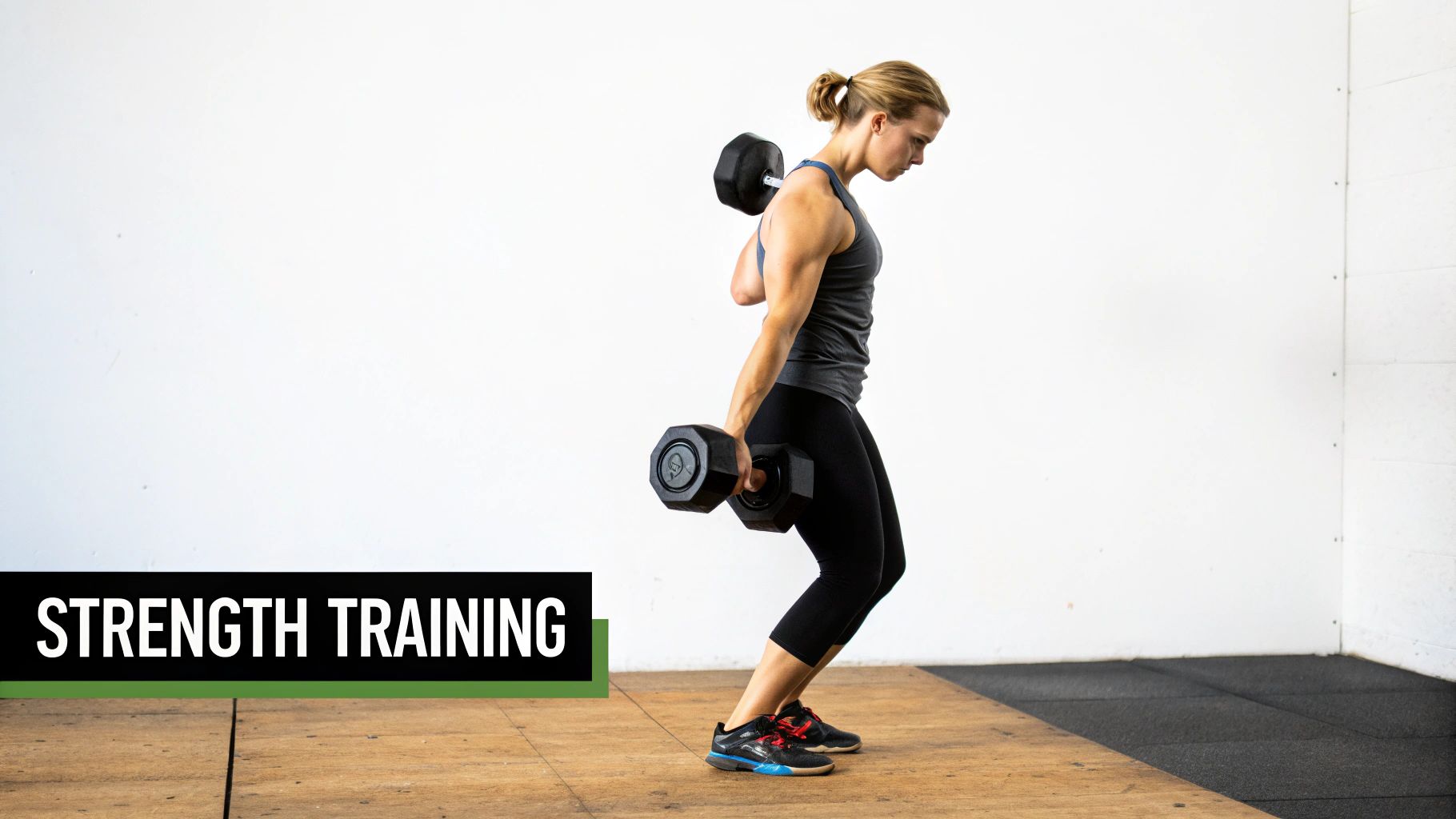
This picture really gets to the heart of it: using the right kind of training to naturally boost your testosterone. It’s not just about brute force; it’s about working smarter. Exercise is a cornerstone of naturally increasing testosterone, but not all workouts are equal. I’ve seen guys putting in serious hours at the gym, tons of cardio and light weights, scratching their heads wondering why they aren’t seeing gains. Truth is, their routine was actually working against them. This section is all about finding that sweet spot – the training methods that truly maximize your hormonal output.
Heavy Lifting and Compound Movements: Your Testosterone Foundation
Study after study shows that resistance training, especially heavy lifting with compound movements like squats, deadlifts, and bench presses, is a game-changer for testosterone. These exercises work multiple muscle groups at once, leading to a bigger hormonal response. I remember when I first switched to heavy compound lifts. The difference in my energy and just my overall sense of well-being was remarkable.
Finding the Right Balance: Intensity and Volume
Now, it’s not just about lifting the heaviest weight possible. You need to find the right balance between intensity and volume. Too much volume can lead to overtraining, which can actually lower your testosterone. Think of it like your car’s engine: redlining it constantly will eventually lead to a breakdown. Your body needs rest and recovery to produce testosterone optimally. Which brings us to another critical piece of the puzzle: recovery.
Recovery: Just as Important as the Workout Itself
Recovery isn’t just about taking a day off. It’s about prioritizing things like sleep, managing stress, and dialing in your nutrition. All these things play a huge role in how your body repairs and rebuilds after tough workouts. A buddy of mine was crushing it in the gym but skimping on sleep. His testosterone levels just wouldn’t budge. Once he committed to 7-8 hours of quality sleep each night, he finally started seeing the gains he’d been working for.
Practical Routines for Real Life: Time-Efficient and Effective
I get it, not everyone can spend hours in the gym. That’s why I want to share some practical routines that deliver, even if you only have 20-30 minutes. A short, intense workout focusing on compound movements can be surprisingly effective. For example, three sets of 8-12 reps of squats, deadlifts, and bench presses. This targeted approach maximizes your time and hormonal response.
We’ll also look at how different training styles, like high-intensity interval training (HIIT), can be strategically added to boost testosterone. It’s about finding what clicks with you, your body, and your schedule. Remember, consistency is king when it comes to naturally increasing testosterone. A sustainable routine you can stick with is better than chasing the “perfect” program.
Sleep And Stress: The Silent Testosterone Destroyers

This image really drives home a point I want to emphasize: sleep and stress have a huge impact on your testosterone levels, and it’s something a lot of guys overlook. You could be nailing your diet and crushing it in the gym, but if you’re neglecting sleep and stress, you’re likely sabotaging your testosterone-boosting efforts.
The Sleep-Testosterone Connection
Let’s be clear, sleep isn’t just about feeling rested; it’s absolutely vital for hormone production. Your body releases the majority of its testosterone during sleep, especially during REM sleep. Think of those deep sleep hours as prime testosterone-production time.
I’ve worked with guys who were doing everything “right”—taking supplements, hitting intense workouts, following strict diets—but their testosterone just wouldn’t budge. The culprit? They weren’t getting enough quality sleep. Once they started consistently getting 7-9 hours of shut-eye, things finally started to change. They saw the results they’d been working so hard for.
Real-World Sleep Strategies for Busy Lives
I know, I know… “Easier said than done,” right? You’ve got work, family, and a life outside the gym. Trust me, I get it. That’s why I want to share some practical tips that you can actually implement, even with a busy schedule.
One thing that’s helped me is creating a pre-sleep routine. Something as simple as a warm bath, reading a book, or listening to calming music can signal to your body that it’s time to wind down.
Another game-changer is optimizing your sleep environment. Make sure your bedroom is dark, quiet, and cool. These seemingly small things can significantly improve your sleep quality and, as a result, your testosterone levels.
Stress: The Testosterone Killer
Chronic stress is another huge testosterone killer. When you’re constantly stressed out, your body pumps out cortisol, a hormone that directly interferes with testosterone production. It’s a bit like trying to fill a leaky bucket – you keep adding water (testosterone), but it keeps draining out (thanks to cortisol).
I had a friend, a high-powered executive, who was incredibly disciplined with his diet and workout routine. But the constant pressure of his job kept his stress levels high, and his testosterone stubbornly low. It was a classic example of how stress can undermine even the best efforts.
Managing Stress for Optimal Testosterone
So, how do you manage stress in today’s fast-paced world? The key is to find strategies that work for you. This could be regular exercise (which, as a bonus, also boosts testosterone!), mindfulness practices like meditation, or even just taking a few minutes each day to practice deep breathing.
It’s also important to recognize your personal stress signals. Are you constantly irritable? Having trouble sleeping? Experiencing digestive issues? These can all be indicators that stress is taking a toll. Addressing these signs head-on is vital for optimizing your testosterone and overall health.
Natural Supplements That Actually Work
We’ve talked about the cornerstones of naturally boosting testosterone: how you eat, how you train, how you sleep, and how you handle stress. Now, let’s dive into the world of supplements. I’ve personally explored this area quite a bit, and trust me, it can be overwhelming. My goal here is to help you cut through the noise and figure out what’s genuinely worth considering.
Understanding the Supplement Landscape
First things first: supplements aren’t magic. They won’t single-handedly transform your testosterone levels. Think of them as supporting players, enhancing the benefits of a healthy lifestyle. They’re the boost, not the base. If you’re considering medical interventions, you might find this helpful: Testosterone Replacement Therapy.
The supplement market is exploding, expected to jump from $365.8 million in 2025 to nearly $550 million by 2032. This growth reflects a rising interest in natural approaches to men’s health. Most testosterone boosters combine vitamins, minerals, and herbal extracts like ashwagandha and fenugreek, aiming to improve muscle growth, energy, libido, and even mood. Learn more about this growing market.
Key Supplements to Consider
Some supplements have a solid track record, both in research and in practice. Take Vitamin D, for example. It’s essential for testosterone production, yet many guys are deficient, especially those of us who don’t see much sun. A simple supplement can make a big difference.
Zinc is another crucial mineral. Sure, you can get it from oysters, but if shellfish isn’t your thing, a supplement is a good option. Personally, I felt a noticeable boost in my energy and gym performance when I started taking zinc regularly.
Then there’s ashwagandha, an adaptogen that can help manage stress—a key factor in healthy testosterone, as we’ve discussed. Ashwagandha really helped improve my sleep, which had a positive knock-on effect on my testosterone levels.
Dosage and Timing: Getting It Right
Just like with exercise, more isn’t always better with supplements. Sticking to the recommended dose is crucial. Overdoing it with certain vitamins or minerals can actually be detrimental. Timing matters, too. Some are better absorbed with food, others on an empty stomach. Do your research – it pays off. Reliable sources are your best friend, and a chat with a healthcare professional can provide personalized advice.
Evaluating Supplement Quality and Avoiding Pitfalls
Not all supplements are equal. Look for products that have been third-party tested by reputable brands. This guarantees you’re getting what you pay for and that the product is free from contaminants. Don’t be swayed by fancy marketing or outlandish promises. Be skeptical. Do your homework. Knowledge is your shield against overpriced gimmicks and potentially harmful ingredients.
The following table offers a quick overview of some research-backed supplements for testosterone support:
Natural Testosterone Support Supplements: Evidence and Dosage Guide
| Supplement | Research Quality | Recommended Dosage | Expected Timeline | Cost Range |
|---|---|---|---|---|
| Vitamin D | Strong | 2,000-5,000 IU/day | 2-3 months | $10-20/month |
| Zinc | Strong | 30-50 mg/day | 1-2 months | $5-15/month |
| Ashwagandha | Moderate | 300-500 mg/day | 4-6 weeks | $15-30/month |
| Fenugreek | Moderate | 500-600 mg/day | 8-12 weeks | $20-40/month |
This table provides a starting point. Remember to consult with a healthcare provider for personalized recommendations based on your individual needs and health status. Finding the right supplements and dosages can take some experimentation, but by focusing on quality and following a healthy lifestyle, you can maximize your results.
Lifestyle Changes That Create Lasting Results
Sometimes, the biggest changes come from the smallest tweaks to your daily routine. Building on the nutrition, exercise, and stress management strategies we’ve already discussed, these often-overlooked lifestyle factors can significantly influence your testosterone levels over time.
Sunlight and Your Hormones: Finding the Sweet Spot
Sunlight’s benefits go beyond just boosting your vitamin D (which is important for testosterone). Direct sun exposure also triggers the release of luteinizing hormone (LH), a vital hormone for testosterone production. Think of sunlight as nature’s “on” switch for your hormones. Too much sun can be harmful though, so balance is key. I personally try to get 10-15 minutes of midday sun a few times a week. It’s a small change, but I can feel the difference.
The Tech Dilemma: Managing Modern Life’s Impact
Let’s be honest, we’re surrounded by technology. But that constant blue light exposure from our phones and computers can disrupt our circadian rhythm, messing with our sleep and hormone production. I’ve tried using blue light-blocking glasses at night, and they definitely help me sleep better. It’s all about managing your tech use, not eliminating it entirely.
Social Connections and Testosterone: The Surprising Link
It might sound surprising, but strong social connections can actually have a positive impact on your testosterone. Spending time with loved ones, doing things you enjoy, and having a sense of belonging contributes to overall well-being, which in turn supports healthy hormone production. I’ve noticed that when I’m more socially active, I generally have more energy and motivation—both signs of healthy testosterone levels.
Building a Testosterone-Boosting Routine
These lifestyle changes don’t mean you need to completely overhaul your life. It’s about incorporating small, manageable habits into your routine. For example, a friend of mine started taking short walks outside during his lunch break to get some sun and disconnect from his computer. Another friend started having regular “tech-free” evenings to spend quality time with his family. These seemingly small changes have led to noticeable improvements in their energy and mood over time.
Age and Lifestyle: Adapting Your Approach
The most effective lifestyle changes can vary depending on your age. For younger men, focusing on sleep and stress management can be especially helpful. For older men, nutrition and regular exercise might be more important. It’s about understanding what your body needs at different stages of life. Remember, the goal isn’t to chase some magic number. It’s about feeling your best, both physically and mentally. It’s about optimizing your quality of life.
Your Realistic Plan For Natural Testosterone Optimization
Let’s talk about putting everything together into a plan you can actually live with. This isn’t about strict rules and deprivation; it’s about making smart, sustainable changes that enhance your everyday life. Think of it as working with your current schedule and commitments, not fighting against them.
Prioritizing the Biggest Wins
Optimizing your testosterone is a marathon, not a sprint. Remember all we’ve covered: nutrition, exercise, sleep, stress, and supplements. Now, think about which of these areas could use the most attention right now. Maybe your sleep is all over the place, or perhaps your diet needs a major tune-up. Focus your energy on the area where you can make the biggest difference initially, and then build from there. For me, just getting my sleep dialed in was a game-changer. I felt so much better that it motivated me to tackle other areas.
Tracking Progress Without the Obsession
Tracking your progress is definitely helpful, but don’t let it become an obsession. Honestly, the most important metric is how you feel. Do you have more energy throughout the day? Are you sleeping more soundly? Are you feeling more confident? These are the true indicators of success. I used to track every little detail, which I found incredibly stressful. Now, I just listen to my body.
Realistic Timelines and the Power of Consistency
It’s important to set realistic expectations. Don’t expect a complete transformation overnight. It takes time for your body to adapt and respond to these changes. I’ve learned that consistency trumps intensity every time. Small, sustainable changes over time yield much better results than drastic, short-lived efforts. Consistently getting 7-8 hours of sleep every night is much more effective than trying to get 10 hours one night and then only 5 the next. You might find this interesting: Latest News and Updates for Testosterone TRT.
Troubleshooting and Adapting as You Go
Let’s be real: you’re going to run into bumps in the road. Life happens! Travel, work deadlines, family commitments – these things can throw off your routine. That’s perfectly normal. The key is to have a few backup plans in place. Maybe you pack healthy snacks when you travel, or you squeeze in a quick, high-intensity workout when time is tight. And just as life changes, so should your plan. What worked for you six months ago might not be the best approach today. Be flexible and willing to adjust your strategy based on your current situation and the results you’re seeing. This is a lifelong journey, not a quick fix.
Celebrating the Small Victories
Don’t forget to acknowledge your wins, no matter how small! Celebrating your progress reinforces those positive habits and keeps you motivated. Did you finally hit your sleep goal? Did you manage to incorporate more vegetables into your diet? Give yourself some credit! These small victories accumulate over time and contribute to significant progress. This journey is about becoming a healthier, more vibrant version of yourself. It’s about feeling your best, both inside and out. Elite Bioscience offers a variety of products and services to support your testosterone optimization journey. From customized TRT packages to peptide therapies and injectable vitamins, they provide the resources you need to reach your goals. Check out their website and see how they can help you unlock your full potential.
